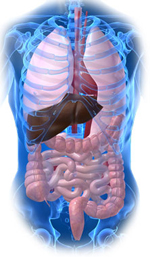Need Digestive System Help?
 Boy, have you come to the right
place!
Boy, have you come to the right
place!
I would be willing to bet that digestive system disorders are probably one of the biggest complaints made most frequently by people in America. If you are a sufferer, that probably doesn't make your pain go away, does it? I have always thought I was immune to digestive problems, because my sister was the one with stomach issues- I was the one with sinus problems and constantly "sick in the head." I had the stomach of steel- and hardly ever threw up, got diarrhea, experienced heartburn, or suffered from indigestion.
But as I look back to my childhood, I remember times of sitting on the toilet forever just to squeeze out a few pebbles. I did not know at the time that THIS was constipation, and never gave it much thought until probably five years ago. Heck, these days all you have to do is turn on Oprah and catch an episode of Dr. Oz talking about "S" shaped poop to get an education on bodily wastes. The information is EVERYWHERE! During my first pregnancy, I got a REALLY good feeling for digestive disorders as I had all of them from heartburn to gas to constipation like I'd never imagined.
Speaking of constipation, as soon as my son started solids (we incorrectly thought cereal was a great first food!) he began experiencing the WORST episodes of constipation. I felt so bad for him. Even today at the age of 6, I have to be careful with his diet because I often see the tell-tale pebbles in the potty. (My kids are afraid to flush after the toilet overflowed a couple of times.)
My mom and sister have both been diagnosed with irritable bowel syndrome (IBS) which, if you have been through the process, you know is a catch-all diagnosis for "we don't know what's wrong with your digestive system." My mom has been diagnosed with diverticulosis and has had a few diverticulitis attacks. They both have horrible diets, so you would think they'd expect this, but eating what you love can put you in denial if it means that you can keep on eating it.
I'm not going to pretend that I eat very well. I have my ups and downs. Remember my "stomach of steel" mentioned earlier? Well, that may be true, but I discovered early in 2007 that I have the gall bladder from hell. I don't have stones, but my gall bladder is just not working, probably from stress, neglected tooth decay, or heredity. So focusing on digestion is very important to me and something I think about every meal. Hopefully by the time you get to the end of this page, it will be something you think about as well, because I may just have the answer to your digestive system problems! Make yourself a cup of tea or a tall glass of water, and sit down and relax. Let's work this out together and see if we can fix your pooper!
By the way, we're not just talking about constipation here. We're talking about everything and anything that happens between your mouth and the toilet, whether it's pain, gas, hard stools, soft or runny stools, or heartburn. If it happens when you eat or drink, we have a solution or two to think about. Here we go...
Digestive System Breakdown
If you didn't sleep through biology class, you remember that digestion begins in the mouth. Saliva helps break down food before you even swallow it. This is where most of our problems begin. Yes, already you are doomed. Because we are not drinking enough water, we are constantly dehydrated. When we eat, our dry mouths don't provide enough saliva- or we are too impatient for our mouths to provide it- so we drink while we eat. And let's be honest: we are probably eating something dry and cakey like bread that won't go down by itself unless it's got something creamy and fatty to help it slide down. Drinking while you eat prevents the natural salivation of acidic juices and digestive enzymes and dilutes what our bodies produce, which prevents the first step of digestion from happening properly. Coupled with the fact that we eat too fast, we are sending down the pipes the wrong food, which has not been chewed enough OR digested enough, further troubling our poor, overworked stomach.
The Stomach
So the next stop in our digestive system is the stomach. Obviously. But do you know what happens there? Or what doesn't happen there? The stomach turns and churns the food, which mechanically breaks down your meal. Hydrochloric acid (HCl) is released which chemically breaks down your food. Digestive enzymes are also released. The functions in the stomach take place when the food entering the stomach signals the stomach to get busy- almost like a well-tuned orchestra. Hormones act as the director, making sure that everyone plays the right note at the right time. That is a very simplistic way of looking at it, and the details right now don't matter too much. What you need to know is this: because HCl production and enzyme levels are frequently low, normal digestion does not take place. It is also important to know that your body produces the right enzymes for the foods that you have eaten; certain enzymes are meant to digest certain foods.
Why is HCl production low? And what happened to your enzyme levels? HCl is a digestive acid secreted by a healthy stomach when food is eaten. It initiates the digestion of proteins, fats, and carbohydrates and aids in the absorption of several vitamins and minerals. In addition, because HCl is a strong acid, it inhibits the growth of harmful bacteria. Low HCl may be hereditary, but often results from extended use of antacids or anti-ulcer medications, infection in the gut, food allergies, and STRESS. You will read frequently online that "aging" results in decreased HCl, but what it really means is "years of not eating the right foods" which equals "aging." Believe me, there are plenty of "aged" folks out there who have the healthiest digestive systems on the planet- because they have taken care of their system over time. And no matter how old you are, you can reverse and improve your digestion with a few simple steps.
Digestive enzymes come from whole, fresh, raw foods. That probably answers the question, "what happened to mine?" If you eat a lot of processed, canned, or stored food, your digestive enzymes will be low. Not only are you not consuming them, but the digestive enzymes your body does produce are being used to digest food that should have come with its own digestive enzymes. Make sense? Digestive enzymes are substances that allow your body to digest food, and transform it into the various nutrients required to sustain life. As you can see, HCl and enzymes are very important if you want to get the biggest nutritional benefit from the foods you eat. The first digestive enzymes are those that come when your mouth waters in response to thinking about food or smelling food. Once food is swallowed, the body responds by releasing the appropriate enzymes (or not) to the food that needs to be digested. The pancreas produces most of our digestive enzymes but its function may become sluggish due to "age," nutrient deficiencies, and/or poor diet. You can begin improving your digestive enzyme levels by
- Eating whole, fresh, raw foods, or foods that are lightly steamed
- Drinking pure water that has not been fluoridated
- Eating in a slow, relaxed manner
- Diminishing worry, anger, fear, or fatigue before eating.
- Purchasing digestive enzymes to help digestion immediately
Moving on to the Small Intestine
Food that has been churned and digested into liquid form in the stomach, is slowly released into the small intestine for further processing. This is also where most of the absorption happens: where the nutrients from your food are absorbed through membranes and distributed throughout your body in your blood. The liver and pancreas are very important organs here, and if they are not working properly, life will not be good for you. In regards to the digestive system, the liver secretes bile, which is important to the digestion and absorption of dietary lipids (fats). As mentioned earlier, the pancreas is in charge of releasing the necessary enzymes to digest the foods you have eaten. Besides digestion and absorption of nutrients, the small intestine plays a critical role in water and acid-base balance. It goes without saying, if you don't have sufficient water in your body, your small intestine will not be able to adequately balance water. This is why, over and over, you hear, "drink more water," if you tend to constipate easily. And this is why most people are constipated- they don't like water, or they drink coffee or cola in its place.
What went in...must come out
The final stop in the digestive process is the large intestine, for which three major segments are recognized: the cecum, colon, and rectum. The large intestine does not produce its own digestive enzymes, but contains huge numbers of bacteria which have the enzymes to digest and utilize many substrates. Two processes are attributed to the microbial flora of the large intestine:
- Digestion of carbohydrates not digested in the small intestine
- Synthesis of vitamin K and certain B vitamins
Microbial fermentation in the large intestine is the major contributor to intestinal gas. A simple way of looking at it is this: if your digestive system is working properly from the mouth to the small intestine, your output of gas will be minimal. But if food has slipped by that "rots" in your intestines, you will have more trouble than you know what to do with, including bloating and IBS!
The end of the digestive process is the rectum, where feces are pushed in several mass movements throughout the day. When the rectum feels ready, our brain says, "go" and if we are smart, we will listen. If we are "too busy" or can't get to a restroom, the brain will turn off the "go" signal and feces will collect and get larger. This is unfortunate, especially since it is probably too dry to facilitate an easy exit in the first place. (If it weren't dry, you wouldn't be able to hold off the need to go so long.) For some people, including small children, the sensation has been neglected so frequently that we no longer feel the sensation and end up with large, bloody stools that cause pain upon exit. I can tell you from my little boy's experience that it causes grumpiness and pain before exit as well. Perhaps that is why people are so grumpy these days?
This is something you've heard a million times before, but aside from water, the other necessary component to your diet that will help promote soft, frequent stools is fiber. I've already mentioned something that will increase your fiber intake: fresh, whole, raw foods like fruits and veggies. So if you want to improve your digestive enzymes as well as your fiber, you can do it with one fell swoop. (Yes, I know that it doesn't make it any easier, but I have a way to help with that, too!)
Bloating, Gas, Indigestion, Constipation, Stomach Pain, GERD, IBS, Diverticulitis...
If any of these words make you cringe, perhaps you have been suffering for a while. If you suffered through the anatomy of the digestive system, right about now you are clambering for answers. And you should be! You have either been suffering for years, or taking meds that make you sicker than your original problem, and possibly you now have secondary symptoms such as
- allergies
- arthritis
- sleep disturbances
- migraine headaches
- ADD/ADHD, and
- depression.
I'm sure your doctor never mentioned that these symptoms can be caused by your food intake, but they certainly can! And now you are going to learn how to fix them.
Food Combining
Remember in our lesson above, that foods need enzymes in order to digest in the gut? Well, it turns out that some foods require acidic digestive enzymes. Other foods require an alkaline environment. When you eat these foods together, the acid and alkaline neutralize each other and what you have left is undigested food rotting in your stomach and digestive system- causing gas, heartburn, cramps, bloating, diarrhea, and flatulence. And since digestion takes a lot of bodily energy, while all this is happening, you are searching for a place to take a nap!
If you have any sort of digestive disorder or gallstones, it is likely that you have abused your system over time, even if you did not know it. The good news is, you can learn how to fix your problems practically IMMEDIATELY! Here is what I recommend for you; try one or all. I have had amazing success with all of these, most importantly learning how to combine foods properly.
Bragg Products
I incorporated Bragg products into our diets shortly after I began having gall bladder problems. I have been 100% satisfied with them. Not only do they taste great, but I know that they have helped me digest food properly and get the nutritional benefit from the foods I eat as well. Although I am not big on vinegar, I was quickly able to acclimate since I realized the health benefits.
- Bragg Apple Cider Vinegar - Add a teaspoon or two to the water you drink for numerous health benefits. See link for more information. This product should be available in your local health food store.
- Bragg Liquid Aminos - We use this on lots of veggies, eggs, and my daughter (5) even uses it instead of salad dressing. It is tasty, and provides essential amino acids. This can also be found in your health food store.
- Bragg Healthy Organic Vinaigrette - Ingredients speak for themselves: Bragg Organic Extra Virgin First-Pressed Olive Oil, Bragg Organic Apple Cider Vinegar, Bragg Liquid Aminos, raw honey, garlic, onion and red bell pepper flakes. You might be able to find this at your health food store, as it is a newer product and not all retailers have it in yet. You can order online if you can't find it locally!
Great Taste NO Pain
Learn everything you need to know in order to properly combine your foods with Sherry Brescia's book: Great Taste NO Pain.
I have ordered this book and it's worth every penny!
What's this about fluoridated water?
Many people simply have digestive disorders and other health problems because they are drinking tap water that has been fluoridated. Fluoride is a known irritant for gastrointestinal disorders. We have been drinking distilled water since 2005, but recently my kids received fluoride treatments at the dentist office before I even realized they were giving them to them. Before we even got to the car, my daughter complained of feeling nauseous. For three days, she had terrible intestinal pain throughout the trunk of her body. Without going into the debate about health implications from fluoridated water, the fact is that some people are extra sensitive to fluoride and shouldn't consume it at all. I personally believe no one should, but it's clear that some are more affected than others (my son was fine from the same treatment). You can remove fluoride from your drinking water by using a home water distiller (shown below).





